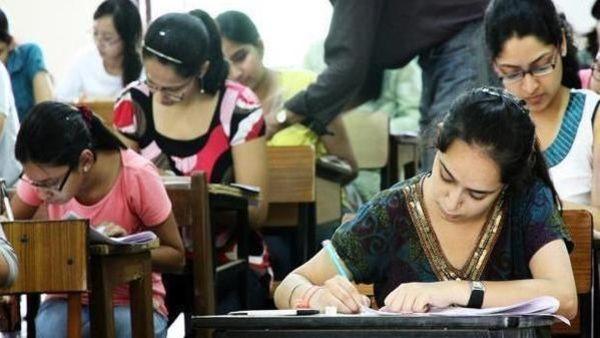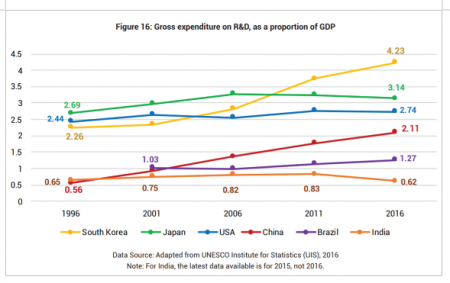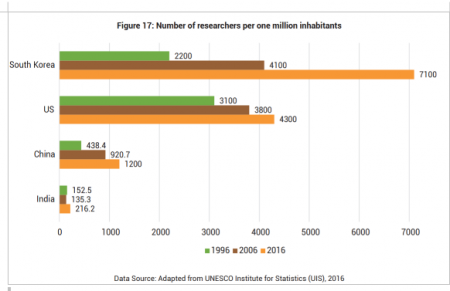India Has Fewer Researchers Than China and South Korea, Says Report

Representational Image. Image Courtesy: Hindustan Times
India has 216.2 researchers per one million inhabitants, against 1,200 in China, 4,300 in the US, and 7,100 in South Korea, according to a report published by a policy think-tank, Brookings India.
The report titled Reviving Higher Education in India pointed out that China and South Korea’s increased expenditure on research and policy reforms has resulted in a huge increase in the number of researchers in these two countries. The United States has also witnessed a steady rise in its research capacity.
According to the report, India is falling way behind other countries in terms of funds devoted to research and development (R&D). It pointed out, “India’s gross expenditure on R&D (GERD) as a proportion of GDP in 2015 (0.65) is almost similar to that in 1996 (0.62) (Figure 16). In sharp contrast, China’s expenditure on R&D has risen rapidly and almost quadrupled in two decades, while the United States’ expenditure has increased steadily. Chinese universities have quickly recognised that PhD students are the workforce of research business. In 2017, Tsinghua University (China) awarded more than twice the number of doctorates compared to those conferred by MIT (USA). South Korea’s GERD has increased almost 1.5 times since 2006.”

Despite having one of the largest education sectors in the world with more than 51,000 institutions and universities, India struggles with low employability of graduates, poor quality of teaching, weak governance, insufficient funding, and complex regulatory norms. The report pointed out that even though several commissions in India have recommended that the shortage of faculty in higher education can be overcome by offering a large number of postgraduate and research scholarships, and upgrading teachers’ salaries etc., academic institutions in India remain severely under-resourced.
According to the report, one of the key reasons behind poor research performance of Indian higher education institutes has been the lack of rewards provided to researchers. Any cutting-edge research and its dissemination through publication of high-quality journals are designed to help drive the quality of institutional activities. It said, “The prestige of universities, globally, depends on the publications its faculty produces. Therefore, researchers who publish their work are valuable assets to institutions, and the research work has to be monetised by more than merely providing researchers with credits for the same.”
The report added, “While researchers have academic freedom in India, the current system provides few incentives to foster highest standards. Rewarding high performing faculty members is a proven way of building a culture of performance. Research shows that ‘producers of ideas and concepts’ respond to incentives. This, in turn, can increase their competence and make them more productive, effective, efficient and satisfied in the long run.”

As per the report, despite an increase in publications, low citation impact as indicated by ‘citations per document’ implies that the quality of Indian research papers is not on par with that of other countries. The relative impact of citations for India is half of that of the world average. “As one of the lowest-income countries in the world at the turn of the 21st century, China’s rise to becoming a super-power in scientific knowledge in less than two decades is remarkable. India should make efforts to replicate the same,” the report said. It underlined that the low research capacity is also reflected in patent applications. India filed 14,961 patent applications in 2017, while China filed 1.24 million applications in the same year.
The report said that monthly allowances provided by higher education institutes can improve pursuance of research. Institutions like the Indian Statistical Institute and All India Institute of Medical Sciences grant stipends to postgraduate students and research fellows; such reward programmes hold great promise. Publications transfer new knowledge to a global audience and serve the larger cause of dissemination of information and increased application of research findings and results.
It said, “Globally, providing awards as incentives is not only about money, but also aims at increasing the number of international publications, without compromising quality, and motivating staff to publish regularly. Such reform can only be driven by institutional change.”
Get the latest reports & analysis with people's perspective on Protests, movements & deep analytical videos, discussions of the current affairs in your Telegram app. Subscribe to NewsClick's Telegram channel & get Real-Time updates on stories, as they get published on our website.
























